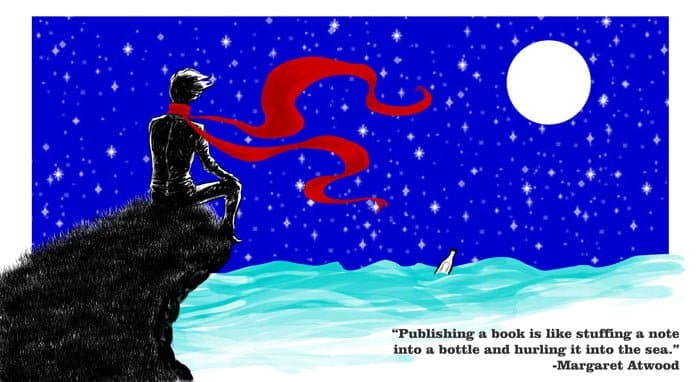Self-Publishing or Traditional Book Publishing Houses
Early on in the publishing process, authors need to make an important and far-reaching decision. Do I put forth the effort to battle traditional book publishing houses, or do I learn how to self-publish?
While understanding that the return on investments is only part of the big picture, it is important to get a grasp on this strategy early on as it will shape your entire approach to publishing.
The publishing world has always presented serious challenges for authors, and in some ways the changing landscape in recent years has made things even tougher.
The digital revolution has made publishing more accessible in the age of Amazon, with nearly infinite ways to make content accessible to readers. Still, it has become harder to make a living for many authors.
It may be easier to make content available, but it is another challenge altogether to put that content in the hands of readers, and a different beast entirely to make a living doing so. Self-publishing services have become an increasingly popular alternative for authors in need of a new approach.
Future of Book Publishing Houses
In 2010, Garrison Keillor said:
“Call me a pessimist, call me Ishmael, but I think that book publishing is about to slide into the sea.”
He explained:
“If you want to write a book, you just write it, send it to Lulu.com or BookSurge at Amazon or PubIt or ExLibris and you’ve got yourself an e-book. No problem. And that is the future of publishing: 18 million authors in America, each with an average of 14 readers, eight of whom are blood relatives. Average annual earnings: $1.75.”
Some things haven’t changed, of course – authors still need to bring in sufficient money if they want to make a livelihood out of their writing.
It’s Not Getting Better
So the challenge now falls primarily on individual authors to figure out how to make the new publishing economy work for them. Some have turned to the growing world of self-publishing services, taking advantage of the digital marketplace.
Carter Phipps, author of Evolutionaries: Unlocking the Spiritual and Cultural Potential of Science’s Greatest Idea, tells his story of publishing his non-fiction book with one of the “Big 5” top publishers in 2012.
Ultimately, his book was considered modestly successful, earning the company back their investment which included a $20,000 advance. The publisher ensured that his book was carried in major bookstores, and helped sell the rights to the book overseas.
As of writing his article, the book had sold nearly 13,000 copies. Essentially, this allowed the publisher to break even on their investment – a considerable accomplishment, considering that 7 out of 10 books lose money, according to industry sources.
However, at the end of the day, even that relatively successful book failed to translate into substantial earnings for the author. He made little money beyond the initial $20,000 advance, 15 percent of which went directly to the author’s agent.
That meant three and a half years of work, one of which entailed full time writing, yielded a total of about $17,000. A relatively well-received book, promoted and distributed by a major publisher, made the author the equivalent of 8 dollars an hour for one year of work.
The process also necessitated further out-of-pocket expenses and nine months spent traveling the country for promotion. To make matters even worse for authors, many publishers are unlikely to invest in a second book if the first was not a big earner.
Considering how paltry the earnings can be for even a successful book, it is important to remember that this story is far from a worst-case scenario. At one point, the author’s book climbed to number 13 on Amazon’s list of bestselling books during one successful day of the promotional campaign.
A week later, Phipps was told by his publisher that the book had just barely missed qualifying for the prestigious New York Times bestseller list.
Book Publishing Houses In The Digital Age
Assuming the same level of sales, if the book had been self-published in print and e-book formats, Phipps calculated he could have earned over $45,000 using a self-publishing service. Accounting for self-publishing costs including copyediting and proofreading, cover design, and formatting, there would have been additional costs as high as $10,000, leaving an income of at least $35,000 after these expenses.
While noting there may be some non-financial benefits to working with a ‘Big 5’ publisher, Phipps predicts that the appeal of self-publishing is still on the rise. Advances from publishers are down by as much as 75 percent in recent years, and large companies have become increasingly risk-averse – especially towards authors without a pre-existing public persona and platform.
Meanwhile, self-publishing is gaining traction and market share – several recent bestsellers such as Fifty Shades of Grey were self-published to get their start. Things have changed since Keillor’s bleak prophecy in 2010.
Perhaps authors looking to navigate the modern publishing scene should look for a middle ground between traditional book publishing houses and self-publishing. A high-quality self-publishing service can offer authors more royalties from their books, while also providing talent and expertise along the lines of larger companies.
Authors should scale the services they pay for to their own needs, rather than sacrificing an untenable amount of the profits from their work. Self-publishing can give authors better control over their costs, while still providing essential editing and design services.
It can offer a faster, more streamlined process, which along with better royalty rates, can make publishing more feasible for authors trying to make ends meet. For an increasing number of authors, the high price of boasting the big name of a top publisher is becoming an unnecessary expense.







